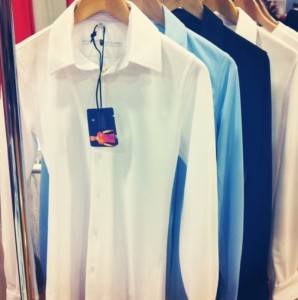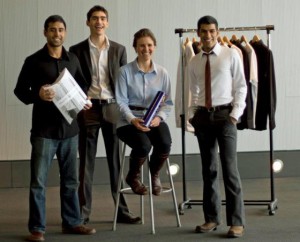The NASA-Influenced Dress Shirt
-
-
slice.mit.edu
- 4
Filed Under
Recommended

As heat waves engulf most of the country this week, many professionals are dealing with a very serious problem: the sweat-soaked dress shirt, often the result of a too hot commute to work each morning.
A group of MIT graduates and students are hoping to make this problem a thing of the past. The Ministry of Supply, a Boston-based company formed at the Institute in 2010, has created a dress shirt which utilizes NASA-grade technology that adjusts to your body temperature.
From Forbes:"The shirt takes the phase-change materials used in NASA space suits to craft a dress shirt that adapts to its wearer. If it is warm out, the shirt pulls heat from your body to cool you down, removing sweat and odor as it does so. When the office air conditioning starts to chill, the shirt releases the energy it stored to warm its wearer back up, all the while remaining wrinkle free."

The Ministry of Supply is comprised of Kevin Rustagi '11, Gihan Amarasiriwardena '11, and MBA candidates Kit Hickey and Aman Advani. The group began selling limited-supply shirts last year. Their first dress shirt, dubbed the Agent, sold out last fall.
To generate funding for their newest shirt, The Apollo, the team launched a Kickstarter campaign on June 8, with the initial goal of raising $30,000 dollars in about a month. Within the first week, they reached their goal. As of July 6, with five days remaining in the campaign, more than 1,600 backers have donated more than $233,000.
The shirts will be American-made (Los Angeles and New York) and retail for around $130 per shirt. The team recently added a showroom at 105 South St. in Boston, where they are requesting feedback for their current line of projects.








Comments
BG
Wed, 07/03/2013 10:17am
What I really want to know is the thermal coefficient of the shirt and reflective heat index. I'm assuming the black shirt has higher radiation coefficient than the white ones but I'm still unsure of how much the difference is. More importantly; I will like to understand the Linear Costing Coefficient (LCC) if this shirt is priced linearly to performance of baseline comparison or does it have an exponential costing model and if it does, whats the value of the exponent.
Emil Friedman
Thu, 07/19/2012 1:36pm
How stain resistant is it? At $130/shirt I would be afraid to wear it while drinking tea behind the wheel or at my desk.
mkt
Sat, 07/07/2012 12:26pm
And how much energy can it store ...how much latent heat does the fabric have?
Judith Ronat
Fri, 07/06/2012 3:54pm
How much does this shirt weigh? And how much space does it take when packed?